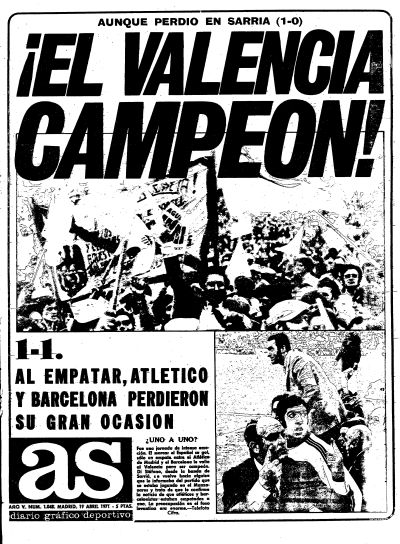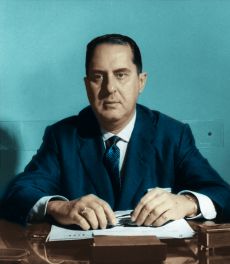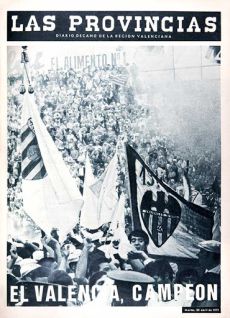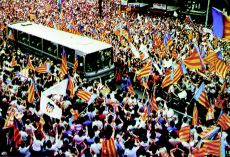
For
On April 18, 1971, Valencia won their fourth league title. Valencia was proclaimed champion against the prognosis, in a championship final equalized like few in the history of the competition and leaving matches, goals and images for the memory and the black and white legend. That League of 1971 is part of the collective imagination of Valencianism. It is for breaking up with 24 years of drought since the last time it was the best team in Spain (1947) and for the 31 years that passed until it was again (2002).
Valencia transferred his character “rough and cupbearer” to the competition of regularity. Abelardo was the goalkeeper with the least thrashed in the championship (15 goals in 30 games) and the defense, with Antón, Tatono, Sol and Aníbal, earned the qualification of “the white wall” thanks to the 17 games in which he did not concede a goal. That Valencia turned every goal it scored into gold and thus the 8 goals scored by Forment, its top scorer, contributed to eight of the 17 victories achieved by the team, which won seven of them 1-0.

Enlarge
The president of the Spanish Federation gives Paquito the title of 1971 League champion.
DAILY AS (DAILY AS)
It was a Valencia managed sensibly by Julio de Miguel and the manager's know-how Vicente Peris. It was a Valencia led from the bench by Alfredo Di Stéfano and captained on the grass by Paquito Y Claramunt. A team with more men than names; forged with football workers like Anton, Hannibal or Tatono and people who had come from under the house like Claramunt II, Juan Sol or Lifegany; a Valencia that in summer had said goodbye to myths like Waldo, Roberto Gil or Vicente Guillot and that was reinforced with Oscar Ruben Valdez, Pellicer, Sergio Y Uriarte.
Valencia grew as the days went by until they became champions. Nobody would have imagined after the first five days, in which he only added one victory, that they would end up lifting the title. But Di Stéfano always had faith in “the boys” and they took to the maximum expression one of the many reflections that the 'Saeta Rubia' left for posterity: “No player is as good as everyone put together.” This is how a Valencia champion was created.

AS cover from April 18, 1971.
“Who was going to say at the beginning of the League that Valencia would be a serious contender for the title? And yet, you see how our policy has given us good results. But it is also that we cannot make other types of signings; We are not a rich club, but we are orderly and I believe a lot in youth. “The phrase was said Julio de Miguel in an interview he gave Mundo Deportivo in the Valencia-Barcelona preview that was played at Luis Casanova on February 28, 1971, when the team was already leading the standings.
Julio de Miguel was president of Valencia from 1961 to 1973. If Luis Casanova was the president who made Valencia the best team in Spain during the 1940s, Julio de Miguel went down in history as the one who promoted the club in Europe. Under his mandate Valencia conquered two Fair Cups (1962 and 1963) and the 1967 Cup. But the 1971 League is undoubtedly the title that generated him the most pride. “I am the happiest man because I see happy the thousands of fans who have led us to the title,” he told reporters in the dressing room of the Sarriá stadium, minutes after being proclaimed champion.

Julio de Miguel, president of Valencia in 1971.
DAILY AS (DAILY AS)
Citrus businessman, born in Madrid, Julio de Miguel assumed the presidency of Valencia on July 2, 1961 after the resignation of Vicente Iborra due to health problems. His mandate is the second longest in the Mestalla entity after that of Luis Casanova. Specifically, he remained in office until June 6, 1973, after three consecutive Cup runners-up, and giving the witness to Francisco Ros Casares. But, in truth, the Julio de Miguel era ended a few months before, specifically on February 13, 1972, the day he died at the Mestalla, at the conclusion of a Valencia-Atlético de Madrid, Vicente Peris Lozar.
Vicente Peris was the brain in the management of Valencia. His influence on the day-to-day life of the club and the team itself transcended his position as manager. Formed in the shadow of Luis Colina, Vicente Peris was for Valencia like Leonardo Da Vinci for humanity: a soccer polymath. He was the confessor of the players and one more assistant to Di Stéfano. He was an ideologue in the setting of the matches and the promoter of improvements in the lighting of the stadium. He recovered the Orange Trophy and promoted international tours such as the one that led Valencia to inaugurate one of the most legendary stadiums in football: the Azteca of Mexico.

Vicente Perís, first from the right, on the bench next to Di Stéfano.
Vicente Peris fought in the offices during that 1971 League for Valencia and also for his fans. Never in history has such a large landing of Valencian fans been repeated on the fields of Spain following theirs as in the final stretch of that championship and Vicente Peris was there every week to scratch entrances from here and there. The manager, in his defense of the interests of the club, launched a Ordago to the Federation in the penultimate day of the League for what he considered an attack on the “purity” of the competition, when schedules were not unified despite the equality in the classification. The influence on the offices of Vicente Peris was key in that League, as much as Abelardo's saves or Forment's goals.
Di Stéfano reached the Mestalla bench thanks to the efforts of José María Sánchez Lage, who was a scout for Valencia in Argentina at the time of Julio de Miguel. His career at Boca Juniors, where he won his first two titles (National and Cup), made him the chosen one to turn the black-and-white project around. Among his first decisions, to dispense with three legends of the entity: Vicente Guillot, Roberto Gil and Waldo.

“When I decided to sign Di Stéfano, my decision was made calmly and logically. After hearing so much about Di Stéfano, a true football teacher, I thought that it was what we needed, especially after having suffered a humility in the Elche and having triumphed in Argentina “, he commented then Julio de Miguel.
“After hearing so much about Di Stéfano, a true football teacher, I thought it was what we needed”
Julio de Miguel (Mundo Deportivo, December 1970)
Say Stéfano, that led Valencia in three different stages, He also went through the benches of Elche, Boca Juniors, Sporting de Lisboa, Rayo Vallecano, Castellón, River Plate and Real Madrid. His milestones as a coach, beyond the titles won with Valencia (League, Recopa Y European Super Cup), were two national championships and an Argentine Cup and a Spanish Super Cup with Real Madrid. But, what has been said, the Di Stéfano coach made a career at Mestalla, still being today the coach who has directed the ché team the most official matches (313).
Curiously, his debut in an official match in Spain with Valencia was against Real Madrid at the Santiago Bernabéu (2-0). After that defeat, Di Stéfano left a phrase that over time is seen as a warning to sailors: “Until the necessary coupling is acquired, this style can be seen as dangerous … but afterwards everything will go smoothly”. As i said Juan Sol In an interview with AS at the beginning of that season: “It makes us play without stiffness. A defender can advance and even score, than defend a forward. All in a harmonious way.” And that's how Valencia won the League.
Di Stéfano made physical condition a differential factor for Valencia compared to all its rivals and defensive solidity, his obsession. “Surely tomorrow the guys from the press will speak wonders of the Manzanares game, they will say that it has been a round trip … but we go home with three goals conceded; so the next time there is if you score one and do not receive any “, remember Forment What he told them after losing 3-0 against Atlético de Madrid, in the only game in that league that they conceded more than two goals.
“Di Stéfano makes us play without stiffness; just as a defender can advance and even score, than defend a striker”
Juan Sol (Diario AS, January 1971)
Di Stéfano always believed in the possibilities of his players (“I think that boys can be champions”, he ventured in December, when he was already competing face to face with Atlético, current champion, Barcelona and Real Madrid) and his footballers always believed in his message (“He knows how to motivate us”, emphasized Antón in a previous one against Elche). His philosophy was the 'one for all': “I live modern football, not the old one; In modern football, the scorer does not exist, the goals are scored by anyone “.
One of the iconic images of that 1971 League is that of Di Stéfano on the Sarriá bench asking the stands if Atlético and Barcelona were still 1-1. That result gave Valencia the title despite their defeat against Espanyol. That afternoon Di Stéfano smoked the two packets of cigarettes “that he was carrying and I lost count of those they gave me.” “We played the worst game of the season … but we are not champions by chance“Saeta Rubia said during the celebration in the dressing room.
Abelardo, Jesús Martínez, Antón, Aníbal, Claramunt, Sol, Sergio, Paquito, Forment, Pellicer, Valdez, Tatono, Claramunt II, Jesús Martínez, Poli, Vidagany, Ansola, Barrachina, Fuertes, Uriarte, Nebot, Jara, Cota and Pesudo They were the 1971 League champions. They made Valencia the best team in Spain 24 years later and led them to play the European Cup for the first time in their history.
Eight Valencians, four Basques, three Asturians, two Galicians, two Andalusians, two Paraguayans, one Argentine and one Murcian. Abelardo, Antón, Aníbal, Claramunt and Sergio participated in the 30 league games; the participation of Uriarte, Nebot, Jara, Cota or Pesudo was testimonial or null in the case of the substitute goalkeepers. But Di Stéfano managed to form a great family with all of them, of which Paquito was its captain and Claramunt, its spiritual leader.
The League of 1971 left novel evenings. In fact, his story has inspired books and documentaries. Because of its final outcome alone, it is worthy of eternally remaining in the memory of Spanish fans, although on the way to the title, Valencia and its fans experienced games and goals that explain why football is called the king of sports.
Valencia went from less to more during the championship. Fate wanted to be capricious with Di Stéfano, who made his debut as a coach in what was his home in Spain as a footballer. Valencia debuted against him Real Madrid in a red shirt and with a “tough, leathery game, classic on them.” But two goals from Pirri left the points in Chamartín.
The first five days raised doubts about Valencia. He only achieved a victory against The palms (5-1) and in that phase they suffered their only defeat at home in the entire championship, against Seville on the third day (0-1). This added to two draws against grenade (2-2) and Real society (0-0) took Valencia away from the head. But his feelings against the Donostiarras were good and if it weren't for goalkeeper Esnaola, the victory would have been his.
Valencia, on matchday six, on their visit to Sporting de Gijón (0-1), began his idyll with the goals in the last blows of the matches. Aníbal gave him the victory in the 86th minute, a trend that would be quite common throughout the championship and that had its climax in the decisive stretch of the championship, with the goals of Forment and Antón against Celta and Sabadell.

Sports World Newspaper Library
The victory against Sporting was the first of four in a row that the team chained and that raised them in the standings. Among them, two victories followed by Barcelona (0-2) at the Camp Nou, which was the leader, and Atlético de Madrid (1-0), current champion and undefeated until that day. It was in this phase of the championship that Abelardo achieved what was until then the unbeaten record of a Valencia goalkeeper. The Asturian was seven days in a row without conceding a goal. Relevant the penalty that stopped Martí Filosía at the Camp Nou and his subsequent performance in San Mamés against him Athletic (0-0).
The Celtic stopped the trajectory of the team (1-0). In Vigo, on matchday 12, Valencia suffered the third of only five defeats it would reap in the entire championship (Real Madrid, Sevilla, Celta, Atlético de Madrid and Espanyol). Even so, despite Jiménez's header, the Galician newspapers said: “Valencia is the best team that has gone through Balaídos so far.” It is not surprising based on such comments that the black and white rivals had to wait 11 games until they saw him lose a game again (3-0, Atlético).

Sports World Newspaper Library
The journalistic Valencia began to believe that their team could fight for the title as a result of the 1-3 victory in Altabix against the Elche. A) Yes Working day titled “Valencia behaves as a team with obvious aspirations to the title” and I raised He directly said that “Valencia is a candidate for the title.” Such sensations were reaffirmed two days later, when the Real Madrid visited Luis Casanova (1-0). Forment scored the goal of a victory that put Valencia in the lead for the first time, tied on points with Atlético de Madrid.
With eight days to go the Barcelona visit the Luis Casanova. Valencia came to that game as leader, after a career of three draws (The palms, Seville Y Real society) and three wins (grenade, Sporting Y Malaga, the latter thanks to another penalty stopped by Abelardo). Rexach advanced to the Barcelona and Paquitó put the definitive 1-1 to a party in which, according to collected Sports world in his chronicle file: “The referee acted almost the entire second half barefoot due to discomfort in the shoe.”

Cover of the Provinces of April 18, 1971.
A week later, Valencia visited the Manzanares. First against second. That was the 1000th game in Valencia's Primera. The previous days were marked by the complaint to the National Association of Referees for the appointment of Medina Iglesias and by the announcement in the press of Di Stéfano's two-season renewal. “Valencia played excellently until the break” but ended up suffering the biggest win of the year: 3-0, with goals from Gárate and Luis Aragonés. That triumph placed the rojiblancos leaders, with the same points as Valencia (33) and only one more than Real Madrid and Barcelona (32).
Critics began to believe that Valencia, in the absence of six games, would be a victim of pressure. Nothing could be further from the truth. Di Stéfano's team had five consecutive victories: Athletic (4-0), Saragossa (0-2), Celtic (2-1), Sabadell (0-1) and Elche (3-0). It was the phase of the eternal goal of Forment or the miracle of Antón in the Creu Alta. And so, as the leader of the League, with one point more than Barcelona and two more than Atlético, Valencia arrived in Sarriá.
Valencia was visiting a Spanish that nothing was being played, although the Espanyolista coach had made his aspirations clear in the previous days: “We want to win so that the title stays in Barcelona.” At the same time as in Sarriá, Atlético and Barcelona would meet at Manzanares. Valencia was the only one of the three that depended on itself. If he won, champion. Even if Atlético tied and didn't win, too. But Di Stéfano's men played worse than ever and Lamata, with a header, made it 1-0 in the 62nd minute. At that moment, Barcelona, who were winning 0-1 thanks to a goal from Marti In the 59th minute of his match, he was the champion. But at minute 64 Luis Aragones put the 1-1 in the Manzanares. No marker moved anymore and Valencia, despite losing, was proclaimed champion.
The chemistry that existed between the team and the fans was undoubtedly one of the keys to the title. Mestalla, then called Luis Casanova, played a fundamental role in the achievement of the fourth Valencia League. In addition, there were some conditions that transformed the stadium into the perfect setting for the team to be champion.

Enlarge
SOCCER El Palmito de Aldaia, in Sarriá in 1971.
DAILY AS (DAILY AS)
There were few games in which they did not concentrate in their stands 60,000 people, a capacity that with subsequent remodeling and regulations was reduced. The fans went to football with fireworks as now they go with pipes. Those were times when leisure life in the city was practically concentrated on Fallas week and on Valencia match days. The fans turned to the cause. The game against Barcelona, for example, involved the highest collection until that day in the history of the club, leaving in the coffers the significant amount for the time of 8 million pesetas.

Hemoteca AS.
The fever for Valencia crossed the walls of Mestalla. The fans starred in massive displacements rarely seen before in league matches. Thousands went to the Camp Nou, the Manzanares, Sabadell and, of course, Sarriá. It is estimated that on the last day there were 20,000 Valencianists in Barcelona to cheer on Di Stéfano's team against Espanyol. From the excitement in the run-up to the silence after the goal by the parrots and the nerves to know the final result of Atlético-Barcelona.

The so-called 'Chica de Sarriá', a Valencia fan who was in Sarriá in 1971.
DAILY AS (DAILY AS)
Then, after the 1-1 draw at Manzanares, with Valencia as the new champion of Spain, came the madness, the frenzy, the field invasion and the iconic images of that afternoon, such as that of the “Chica de Sarriá” or “el Palmito de Aldaia” that 31 years later President Jaume Ortí dusted off the day Valencia won the league in Malaga. Today the 'Palmito' presides over the entrance of the VCF Foundation, which restored it a few years ago and is part of the patrimony of the black and white club.
Valencia celebrated the title at their concentration hotel in Barcelona. There it transcended that each footballer would perceive a succulent bonus for the title: 250,000 pesetas. The night was long in Barcelona, although less than the journey back to Valencia was. The team traveled by coach and after stopping at Benicarlo for lunch, the road was collapsed by the caravan of vehicles that accompanied the champions.

The Valencia bus, arriving at Mestalla.
The Valencia coach took four hours to travel 100 kilometers. Made stop at Beacon, the town of Forment; on Puçol, that of the Claramunt; and also in Sagunto. 300,000 people received them in the streets of Valencia and the party ended with a lap of honor by the champions at a Mestalla that was full despite the rain. Those who lived it say that “the cold was worth it.” Valencia took 31 years to become League champion again. And that day, coincidences of fate, it also rained.

